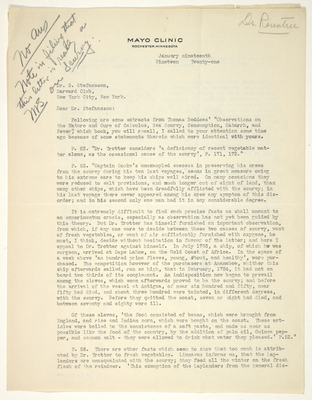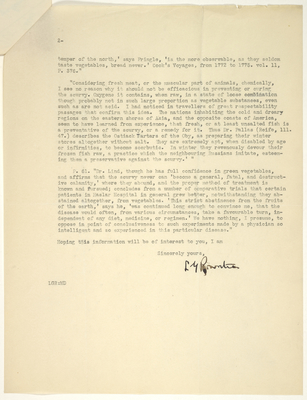Pages
stefansson-wrangel-09-40-010-001
Dr. RounTree
ROCHESTER, MINNESOTA
January nineteenth Nineteen ‘Twenty-one
Dr. B. Stefansson,
New York City, New York.
Dear Dr. Stefansson:
Following are some extracts from Thomas Beddoes ’ ’’Observations on the Nature and Cure of Calculus, Sea Scurvy, Consumption, Catarrh, and Feverwhich book, you will recall, I called to your attention some time ago because of some statements therein which were identical with yours.
P. 52. "Dr. Trotter considers ’a deficiency of recent vegetable matter alone, as the occasional cause of the scurvy’, P. 171, 172.”
P. 53. "Captain Cooke’s unexampled success in preserving his crews from the scurvy during his two last voyages, seems in great measure owing to his extreme care to keep his ships well aired. On many occasions they were reduced to salt provisions, and much longer out of sight of land, than many other ships, which have been dreadfully afflicted with the scurvy; in his last voyage there never appeared among his crew any symptom of this disorder; and in his second only one man had it in any considerable degree.
It is extremely difficult to find such precise facts as shall amount to an experimentum crucis, especially as observation has not yet been guided by this theory. But Dr. Trotter has himself furnished an important observation, from which, if any one were to decide between these two causes of scurvy, want of fresh vegetables, or want of air sufficiently furnished with oxygene, he must, I think, without hesitation in favour of the latter; and here I appeal to Dr. Trotter against himself. In July 1783, a ship, of which hw was surgeon, arrived at Cape LaHow, on the Gold Coast of Africa. In the space of a week above ’an hundred prime flaves, young, stout, and healthy’, were purchased. The competition however of the purchasers at Anamaboe, whither this ship afterwards sailed, ran so high, that in February, 1784, it had not on board two thirds of its complement. An indisposition now began to prevail among the slaves, which soon afterwards proved to be the scurvy; and before the arrival of the vessel at Antigua, of near six hundred and fifty, near fifty had died, and about three hundred were tainted, in different degrees, with the scurvy. Before they quitted the coast, seven or eight had died, and between seventy and eighty were ill.
Of these slaves, ’the food consisted of beans, which were brought from England, and rice and Indian corn, which were bought on the coast. These articles were boiled to the consistence of a soft paste, and made as near as possible like the food of the country, by the addition of palm oil, Guinea pepper, and common salt - they were allowed to drink what water they pleased.’ P.52."
P. 58. There are other facts which seem to show that too much is attributed by Dr. Trotter to fresh vegetables. Linnaeus informs us, that the Laplanders are unacquainted with the scurvy; they feed all the winter on the fresh flesh of the reindeer. ’This exemption of the Laplanders from the general dis-
stefansson-wrangel-09-40-010-002
cl
2-
temper of the north,1 says Pringle, 'is the more observable, as they seldom taste vegetables, bread never.' Cook's Voyages, from 1772 to 1775. vol. 11, P. 376."
"Considering fresh meat, or the muscular part of animals, chemically,
I see no reason why it should not be efficacious in preventing or curing the scurvy. Oxygene it contains, when raw, in a state of loose combination though probably not in such large proportion as vegetable substances, even such as are not acid. I had noticed in travellers of great respectability passages that confirm this idea. The nations inhabiting the cold and dreary regions on the eastern shores of Asia, and the opposite coasts of America, seem to have learned from experience, that fresh, or at least unsalted fish is a preventative of the scurvy, or a remedy for it. Thus Dr. Pallas (Reife, 111. 47.) describes the Ostiack Tartars of the Oby, as preparing their winter stores altogether without salt. They are extremely apt, when disabled by age or infirmities, to become scorbutic. In winter they revenously devour their frozen fish raw, a practice which the neighbouring Russians imitate, esteeming them a preservative against the scurvy.! "
P. 61. "Dr. Lind, though he has full confidence in green vegetables, and affirms that the scurvy never can 'become a general, fatal, and destructive calamity,’ where they abound, and the proper method of treatment is known and fursued; concludes from a number of comparative trials that certain patients in Haslar Hospital in general grew better, notwithstanding they abstained altogether, from vegetables. 'This strict abstinence from the fruits of the earth,' says he, 'was continued long enough to convince me, that the disease would often, from various circumstances, take a favourable turn, independent of any diet, medicine, or regimen.' We have nothing, I presume, to oppose in point of conclusiveness to such experiments made by a physician so intelligent and so experienced in this particular disease."
Hoping this information will be of interest to you, I am
Sincerely yours.
LGR:MD

